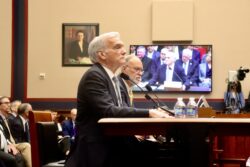On Sunday evening in the Leavey Center Program Room, the seven GUSA presidential candidates gathered to debate their opposing platforms, defending their budget proposals in front of students and campus media. The proposals varied widely in amounts requested, each suggesting different programs and line-items.
Colton Malkerson (COL ’13) and Maggie Cleary (COL ’14) requested $165,000 for their budget, the largest among all of the candidates. Of this money, $144,000 was for line-items, while only $19,000 was for the GUSA Senate General Account. The line-items include an e-readership program to complement the current Collegiate Readership Program and a spring concert planning committee.
Although their ticket’s budget is significantly larger than those of their peers, Malkerson does not think that the amount of money should concern students. “Students should look at what we want to support,” Malkerson said. “We’re putting priority on a concert which is a major part of student life, or should be at least, [and putting a] priority on group clubs and student leaders.”
Clara Gustafson (SFS ’13) and Vail Kohnert-Yount’s (SFS ’13) $23,400 request is the smallest proposal among the candidates. They designed their budget with the mindset that money does not necessarily form the best platform.
“To get things done at this university, you don’t necessarily need money all the time. It’s about working hard to foster relationships with people across campus,” Gustafson said. “And yes, sometimes you do need money to book rooms or provide food or advertise initiatives, which is a lot of what our costs will be.” This priority is demonstrated in one of their key initiatives, $2,500 for a research symposium, of which a large portion would go to a kick-off for the program.
Another difference between the candidates was how to deal with SAFE reform funds. While all candidates agreed that it should go to clubs, some felt that GUSA’s budget should increase as well.
“Most money should be going to clubs, not just to GUSA,” presidential candidate Tyler Sax (COL ’13) said. “A moderate increase in the GUSA budget is appropriate given the increase in available funding this year [from SAFE].” Key initiatives from his budget include the GUSA Partners Fund and an alumni relations program for clubs.
Candidate Murphy Kate Delaney (COL ’13) had a slightly different view. “SAFE reform has led to a significant increase in the amount of funds available for student programming,” Delaney said. “We strongly believe that the majority of these new funds should be distributed among student groups and that GUSA should receive only a small portion.” Their budget requests include additional weekend GUTS bus services as well as an intra-campus bike share program, entitled Bulldog Bikes.
John Morris (COL ’13), on the other hand, said SAFE reform money should go straight to clubs and not to GUSA. He said, “we believe [the SAFE reform money] should go straight to clubs; they know how to use their money best. If it were to go straight to them, that would go a long way in improving GUSA’s relationships with clubs.” Important elements of the Morris-Weber budget include a GUSA student lecture program costing $7,000, and $2,000 towards the development of University administrative office hours.
The role of the University in funding and support became a similarly contentious issue. Daniel LaMagna (COL ’13), whose budget was the shortest of all the tickets, believes the University should take on more responsibility. “We don’t think GUSA should be doing too much paying for stuff, [instead we] should be advocating for the University to change things,” LaMagna said. “They should be the ones paying for it. We pay them already with our tuition dollars.”
Sax disagreed. “The money that GUSA spends is student money and is very different from University money,” Sax said. “Sure, we can ask the University for things, but the power of student government is that you have students directing student money. And that really changes the way we think about it, and changes the things we spend it on.”
A final issue of contention lay in experience. “The other tickets haven’t been as involved in funding issues as much as I have,” Malkerson said. “So I think maybe their budgets could reflect a lack of understanding about how money could best be distributed in student life.”
But many other candidates, including Gustafson, stated that they were involved in other funding initiatives in GUSA, and felt sufficiently experienced to prepare a strong budget.
“[I was] co-founder of SIPS and helped with budgets in that, I also attended the GUSA budget summit last year, and have been very involved in SAFE reform,” Gustafson said.
Some candidates recognized that they had not had as much experience in the financial area of GUSA, but did not feel that it would be an obstacle to their campaign. “I was much more involved in different sorts of policies, such as reforming the Student Code of Conduct, but I would certainly surround myself with people who have had a financial background in GUSA,” Morris said. “[They would] help myself and Lauren out with the intricacies of the budget.”
Polls open on February 23. “Unless you participate, you don’t have a right to complain,” said Nate Tisa (COL ’14), another GUSA executive candidate.



